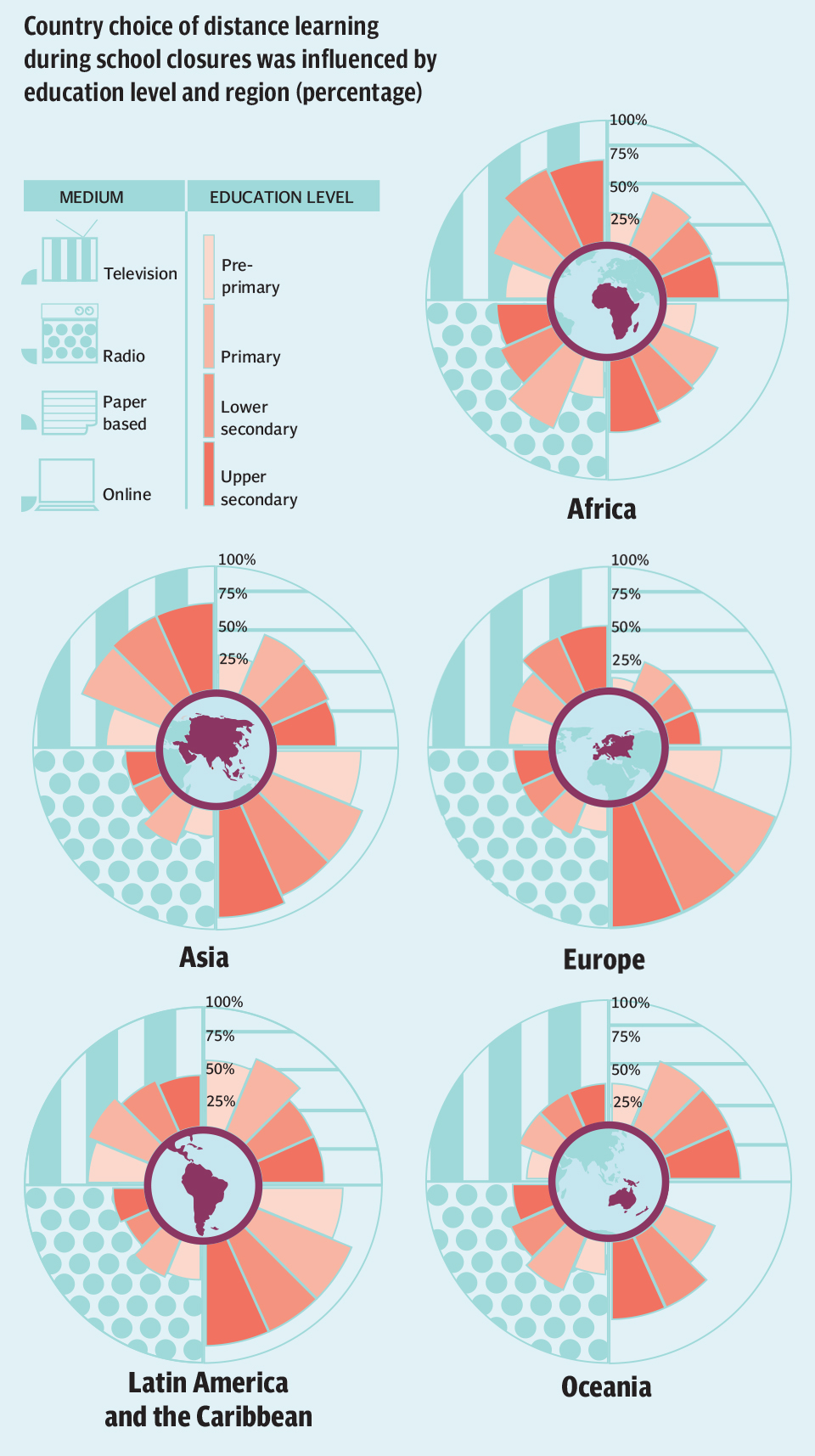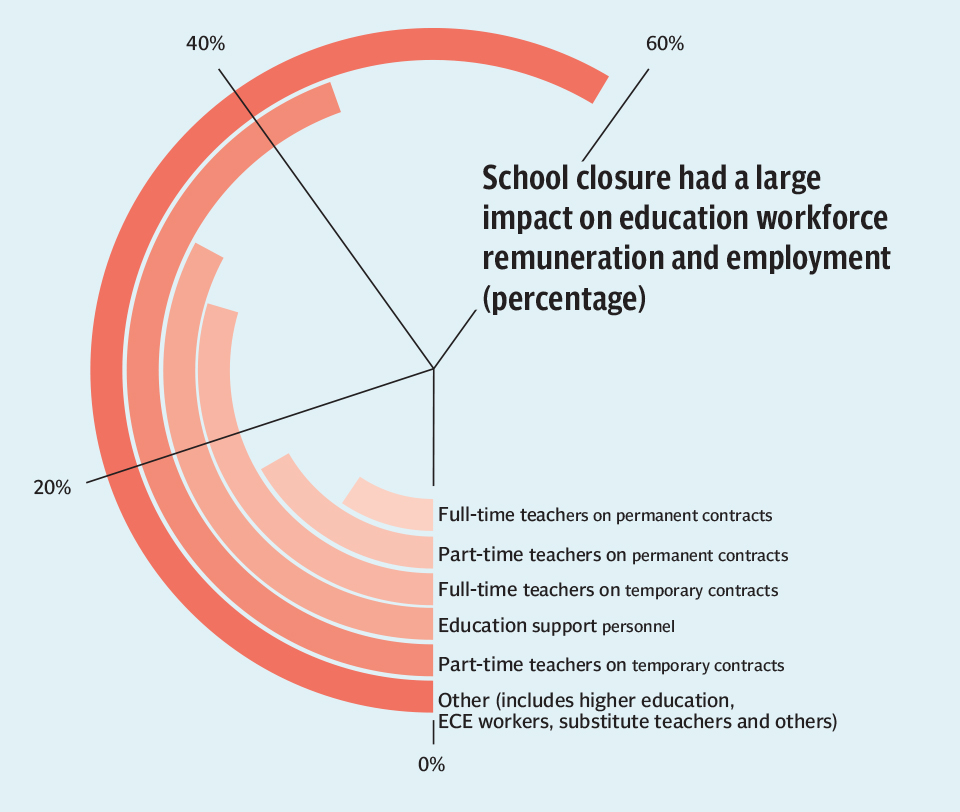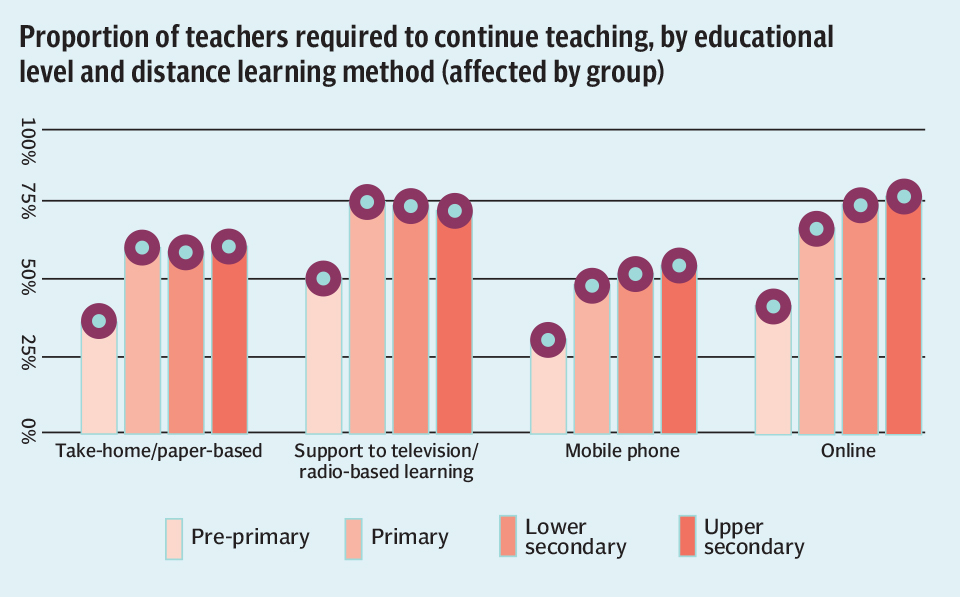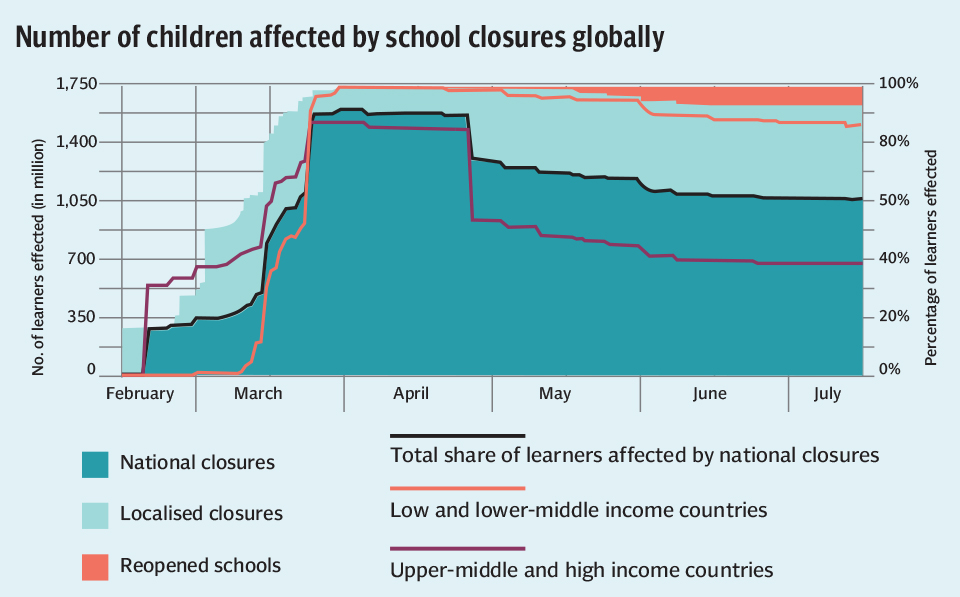For Asma Khan, the principal of a charity school in Karachi’s Ibrahim Haideri area, the first wave of the coronavirus brought ill tidings as the school administration was not in the least bit prepared to transition from physical classrooms to virtual ones. “Before the launch of online classes, we had to train parents instead of teachers,” she revealed with a pained look.
Khan said that the school, after conducting a survey, came to know that the parents of the students did not even posses any kind of tech devices.

“So far, we have provided laptops to 45 parents and mobile phones to 29 others so that their children can attend classes,” she shared about her NGO-run school. “The first half of the pandemic was spent in preparing parents and students for Zoom classes, now it seems the focus will entirely be on revision first.”
The story of Khan and her school is shared by thousands of parents in the financial hub of the country. The year 2020 cast a dark looming shadow over the education system of the country and left the fate of millions of students in a limbo. Delving deeper into the matter would take us back to the time when the coronavirus made its daunting appearance in Pakistan.
Makeshift arrangements
After the first case was reported in February, the tally catapulted in March. Sindh was the first province to suspend academic activities in institutions under a strict lockdown after the first confirmed case and by March, the entire education system of the country was in the clutches of the pandemic.
Nearly a year later, the entire education system is continues to face sheer uncertainty as ministers and educationists mull over a strategy to save the future of Pakistan’s youth. To make up for the time lost, several makeshift arrangements were introduced such as home-based teaching, online classes, promotion to next classes without exams, shortening of the curriculum and major changes in university admissions policies.

With the prevalent circumstances, the impact of coronavirus on the lives of students in schools, colleges and universities across the country will likely continue throughout the year 2021. During the initial lockdown, there emerged three tiers of institutions which made flailing attempts to shift classes online. The first tier began online classes for students who had means to get a virtual education, the other adopted the method of home assignments, while the third comprised a mix of government and private institutions from the underprivileged areas who could not afford anything other than a physical classroom.
Teething troubles
During the phases of uncertainty, students, parents, teachers and school administrations have had some bittersweet experiences. Speaking on the condition of anonymity, the principal of a Cambridge school in Gulistan-e-Jauhar said that they struggled with technology and training of teachers initially. “The relationship between teachers and students at pre-primary level is of crucial importance and plays a key role in their early education. This year, the relationship faltered and could not be re-established. It is hard to pin down young students in front of a laptop to study due to their short attention span. Now, these children do not even comprehend the purpose of an online education,” she said
Noor Hussain, who is the director of community schools and colleges across Sindh under IBA Sukkur, said that 40 educational institutions are being run under IBA Sukkur. Highlighting the rural-urban divide, he said that students from the urban areas such as Hyderabad, Sukkur and Larkana are still taking classes on Zoom. “We have not been able to launch online classes in schools in some urban areas. Most of these tehsils do not have internet facilities,” he said.
When approached, an employee of the Civilisation Public School in North Nazimabad area of Karachi who wished not to be named, said that during the first wave of the virus - lasted for more than six months - the school could only teach one-third of the curriculum through online classes.
“At a few homes, parents did not have three devices at a time for their two or three children studying in our school. For this, we scheduled the classes in such a way that each class could be held separately,” he added.
The administration said that internet connectivity issues continued in the lower middle class. “We made study packs and called the students two days a week after the school reopened for a while.”
Similarly, a teacher of Government Boys Secondary School located in Jahangir Road No 1 said that they give out print outs of lectures to children. “Nothing more is happening,” the teacher added.
"Every class comes to school once a week under the government-laid SOPs and we give them homework," said a teacher from Masoomiya Government School in Sohrab Goth area. The week after, she continued, they check their homework and give them new homework. “When the children came to school after seven months, 60% of them had forgotten what they had learnt earlier,” she said.
The silver lining
Interestingly, things are not that topsy-turvy for everyone and one such case is of Sana Shah who teaches at a private secondary school. “Online teaching can become quite feasible if students show serious attitude. The level of learning has increased too,” she said. “I have interactive tools such as MS Notes, Quizizz, Padlet, MindMeister etc so that the whole class brainstorms or attempts quizzes together.”
Flagging another important issue with the youngsters, the teacher said that students also feel ill at ease with the social media platforms and their vulnerability. “The class eighth students don't like opening their cameras because there are some kids who end up as memes on Instagram meme pages,” she said. “Meanwhile, they also pretend they are attending the class, but the teacher can tell that these kids are not interacting. They try to secretly play video games during the class such as Fortnite and PUBG.”

Shah also lamented the lack of seriousness on the part of parents saying, “You can see my personal WhatsApp on which I have messaged parents asking about the absence of their child from a class but the parents are clueless.”
Parental gripes
It should be noted that the experiences of parents regarding the closure of schools, their reopening and re-closing are also very bitter. Some parents said they have three to four school-going children and only a single device to cater to their education. One such parent pointed out, “All children's classes are at the same time. Which child should we teach and whose education should we compromise?”
A few parents also complained of the additional cost of devices and the Internet apart from the school fees. The parents of students at a well-known private school in the Saddar area of Karachi said that the school shares daily online classes as well as recorded lectures, which has made the children lazy. “They say [students] why take online classes when recorded lectures are available. But then, they don't even watch the recorded lectures later.”
With a no-check-and-balance for classwork and homework, it seems the whole year has gone by in trial and error. Farhat Fatima, the mother of a student at a private school in Federal B Area, shared that her children were not having online classes. “The fee is being paid as usual. Assignments and homework are sent daily on the mobile and WhatsApp. My child has not been able to improve their academic capabilities this year. There is no one to question the schools,” she said.
Likewise, several parents complained that the role of teachers in online classes is limited and the role of mothers at home has increased.
Work-life imbalance
Deviating from the notion, Sameen Omer, a teacher at a private school, opined that the workload has increased as more time is consumed in planning lectures and searching for online tools for enhanced engagement. “The privacy and personal time of teachers has reduced as kids call per their convenience while responsibility has doubled for us because we have to thoroughly check online assignments.”
Highlighting the pros and cons, Omer said that the process has enabled computer-based learning, creativity, learning of new tools while as for the downside, it has made students lethargic, taking a toll on peer interaction and their physical education.
On the other side of the spectrum, during the first six-and-a-half months, the education of students in government schools and private schools belonging to the underprivileged class was almost suspended.
Lasting effects
For some reason, some private schools that did not commence online classes kept in touch with students on the basis of homework or home assignments. However, it was observed that these students kept relying on coaching centres.
In the last session, students could not complete their syllabus due to which after appearing in the next classes, they did not have the background knowledge of some of the subjects. Some school administrators and teachers are of the opinion that after the prolonged closure, when students stepped into schools after September 15 in the second wave of the Covid-19, it felt as if their minds had rusted. According to teachers, it seemed that the minds of the students were no longer a storehouse of information but a blank slate.
Throughout the year, pre-primary children have not been able to have a relationship with their teachers nor do they know anything about a school environment. It is understood that the children of the pre-primary age are far too young to be ready for online classes.
After the first phase of closure, the second phase consisted of physical classrooms with social distancing, while in the third and current phase, students are once again confined to their homes and compromising their education due to the closure of schools.
The Express Tribune also approached the Former IBCC Chairman and the Director of Aga Khan University Examination Board, Shehzad Jeeva, about the issues that came up during the first and second wave of Covid-19 and asked them what they could do to address these issues.
The two top educationists said that like the rest of the world, the education system in Pakistan had also endured a turbulent year. “The educational institutions in 188 countries were closed and an estimated 1.60 billion students dropped out of school. There is no precedent of this sort in the history of education.”
Burning questions
Jeeva said that in 2021, every educator, parent and student has the same question in mind, which is how to continue education in the pandemic and this also now poses a huge challenge for policy makers. He added that Pakistan, like other countries in the world, has devised different strategies to address these challenges as more than 50 million students have been affected by this situation.
He said that students in grades 1 to 8 were promoted in Pakistan. According to Jeeva, at the suggestion of the board, the federal government, in consultation with the provinces, postponed and promoted the examinations of students of class IX to XII.
“The decision was made keeping in view the students’ health, safety and education. Now, the steering committee of the IBCC has sent its final recommendations to the Federal Ministry of Education on how to conduct examinations in schools keeping in view the past issues and challenges.”
Jeeva added that the recommendations have been submitted for the next meeting of the NCOC for approval. “Work is now underway to reduce the academic year and syllabus as well,” he said.
It is noteworthy that the year 2020 came to an end but students across the country including Sindh do not know whether they will be able to take classes in their educational institutions from January 11 as per previous initial government announcement. Later, in an inter provincial education ministers conference, it was decided that schools from grade 9 to 12 would open from January 18th, and grade 1 to 8 as well as universities would begin on the February 1st.
The students fear that they will have to sit at home and continue taking online classes in the near future. There are also students who have entered universities across the country for the first time and they want to go and experience the university life but cannot do that due to the prevalent circumstances.
Long-term repercussions
The pandemic has taken a toll on the mental health of parents, teachers, students and educationists alike. This aspect is mostly brushed under the carpet. To know the gravity of the situation and the long-term impact of remote learning, The Express Tribune approached a child psychologist in this regard. Behaviour Therapist Amna Karimi shared that online schooling and work are things that noone had envisioned before so we can say that we are psychologically not very well equipped for it. “Since this forceful shift to the new normal has never been experienced before there is not enough research data to predict what future impacts it can have,” she said.
The struggle of parents and students has led to the transference of negative emotions within a household, which has been observed, she said, adding that if we look at the psychological aspects of it, many psychological needs of kids are highly deprived.
She said also added that the current situation has also generated a lack of routine and discipline among the youth. Moreover, along with a chronic fear of germs, they are also suffering for depression and experiencing low teamwork spirit.
“There is a need for exploration in kids aged between three and five years; they are scientists who are exploring, discovering and absorbing the world around them through physical experiences. So it is natural for them to roam around and learn through particpation in activities but due to online studies their interaction with the physical world has been compromised,” said Karimi. “A disconnect with the real world and increased gadget dependency can further lead to a lack of social skills. Some researches indicate that lack of social skills can lead to lack of empathy.”
Creative: Ibrahim Yahya
